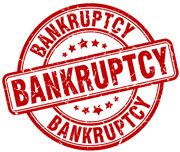Three Common Bankruptcy Myths

Filing for bankruptcy is one of the most significant financial decisions you can make, so you must have all of the facts before you decide. Unfortunately, we meet with clients every day who are laboring under misconceptions about what bankruptcy can do and its effect on their credit score. Before you can decide what is the right path for you, we should clear up some confusion about consumer bankruptcy.
Myth # 1: “I Can Get Rid of All of My Debts in Bankruptcy.”
This is not entirely true. To be sure, bankruptcy can wipe out some of the more common debts, such as credit card debts, personal loans, or medical debt. However, many debts are not eliminated in bankruptcy.
For example, you cannot use bankruptcy to discharge the following:
- Unpaid child support
- Unpaid alimony
- Most federal tax debts
- Court judgments based on fraud or malicious conduct
Bankruptcy also will not automatically eliminate any lien or security interest a creditor has in your property. For example, your car loan is secured by the car itself. Although bankruptcy can eliminate your personal debt obligation, your lender can still seize the car.
Myth # 2: “Bankruptcy Will Kill My Credit Score.”
A lot depends on the circumstances—in particular, just how high your score is when you file. Many debtors settle on bankruptcy only after defaulting on several accounts and seeing them sent to collections. With a long history of non-payment, their scores are in the 500s when they finally build up the courage to file for bankruptcy. For these people, bankruptcy might knock their score, but they weren’t going to get a mortgage or personal loan with that credit profile anyways.
Other clients have managed to make the bare minimum payments but otherwise find themselves floundering financially. They might have a credit score in the 700s when they finally file for bankruptcy. For these people, the fall could be dramatic—150 points or more. Nevertheless, you need to assess your financial goals. For example, you might hope to buy a home in 10 years. With mammoth credit card debts, you’ll never be able to save enough for a down payment unless you get the breathing room that a bankruptcy can provide.
Myth # 3: “I’ll Never Get Another Credit Card or Mortgage Again if I File for Bankruptcy.”
Not true. Of course, we can’t guarantee you’ll get a new credit card or mortgage, because so much depends on the financial choices you make after filing for bankruptcy. But it is simply inaccurate to believe that bankruptcy is a permanent bar to new credit.
For example, after filing, you might open a secured credit card tied to a bank account. After 12-18 months of responsible usage, your credit score should rise, and you can ask to be converted to a regular unsecured credit card. In fact, many people soon find their scores rising rapidly.
Furthermore, bankruptcies do not stay on your credit report forever. A Chapter 7 should fall off 10 years after your filing date.
Considering Bankruptcy? Meet with a Florida Bankruptcy Attorney Today
Filing for bankruptcy is a complex decision which you should not approach lightly. At Nowack & Olson in Plantation, we advise consumers every day who are saddled with debts and looking for a fresh financial start. For a free consultation with one of our lawyers, call us toll-free at 866-907-2970.
Resources:
experian.com/blogs/ask-experian/when-chapter-7-bankruptcy-is-deleted/
uscourts.gov/services-forms/bankruptcy/bankruptcy-basics/discharge-bankruptcy-bankruptcy-basics
